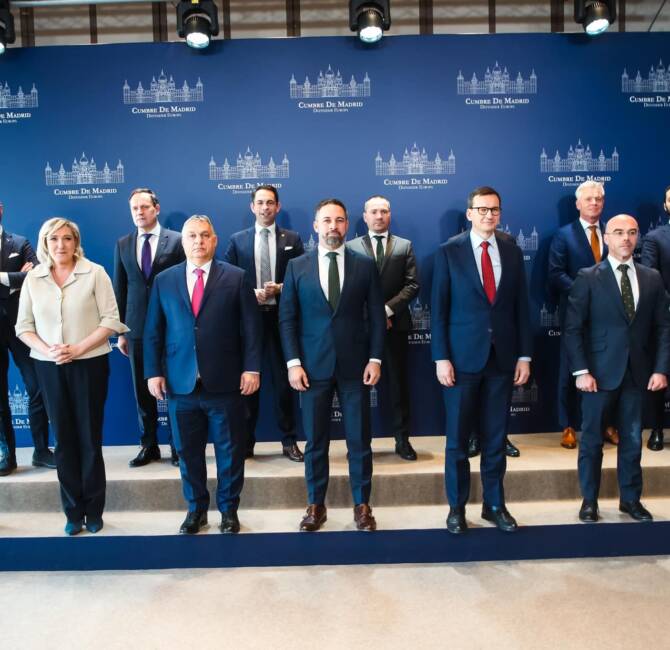Many Americans want the Hungarian path
– Multiple Hungarian sources have already announced that last September, you signed a contract with the Hungarian embassy in Washington. Specifically, what kinds of assignments were you tasked with?
– The entire contract is open to the public online and the Hungarian media has already thoroughly examined every detail, so I won’t bore you with that–but my assignment is basically to find new friends among American conservatives. Despite Hungary’s small size, the world’s most-read platforms mention the country often; it goes without saying, this happens almost exclusively in the framework of incessantly repetitive and expounded pejorative commentary. However, it is one thing to be at the crossroads of media hatred, and another how people react to this. To the outside observer, Hungary is usually seen as the focal point of conflict between globalism and nationalism–a trail blazed by the Hungarian government which many Americans would be delighted to follow. I am referring here to family policy, immigration policy, and the struggle against the abstract network of NGOs and George Soros. The Hungarian government represents values that are sympathetic to many people–and they would be for even more, if not for the constant negative, construed, distorted image of Hungary by the left-wing media. It is my job to help.
– Antisemitism frequently appears among the accusations flung at Hungary on the international stage. You yourself are extremely proud of your Transylvanian Jewish ancestry and family history rooted in Hungarian culture. How do you react to this kind of criticism?
– In short: I find it to be utterly stupid. On the other hand, I understand that Hungarians may be thoroughly confused by the criticisms leveled at them by the NGO networks supported by George Soros and the liberal media which provides their ideology with a front page and millions of views. For me though, as a Jew who has fought against antisemitism my whole life, I have a completely different take on Hungary and the attitude of the Hungarian government towards Jewish culture.
– But why is this accusation brought up over and over again if it has no basis?
– When a right-wing leader or government is to be denounced on an ideological basis, the antisemitism or racism card is immediately pulled. In Europe, labelling others “antisemitic” is an extremely powerful weapon, while in America, the same goes for “racist”. The favored strategy of left- wing powers to overcome ideological debates is to brand their enemies or those they dislike as either antisemitic or racist. The problem with this, is they overuse the terms. At this point, we’ve reached a state where real antisemitic acts barely generate a reaction. It’s practically spilling out of our ears, making a concept that has caused tremendous suffering not only to my family but millions of others, meaningless. Not to mention the fact that the same voices advocating for the antisemitic stamp on Hungary are simultaneously loudly opposing and lobbying against Hamas (which treasures a close friendship with Hezbollah) being on the list of terrorist organizations. The radical Islamist Palestinian organization is defended, claiming it’s not antisemitic–while Hamas is just that, antisemitic. But of course, according to them, it is actually the Hungarians and the Hungarian government. How can this be?
– You’ve worked previously for the Trump administration and even today are often referred to as a “trumper” or “alt-right”. Does this hold a negative connotation in everyday American life?
– You’re mistaken, I never worked for the Trump administration–although I’m well aware that in the recent past the liberal media primarily has painted this picture of me. It is complete insanity, and I can only assume that something was misread during their research. Though it is true that in 2017, I was mentioned in a few articles as an advisor to Trump on national security issues, but these are two totally separate things: I worked for a think tank as one of thirty-forty colleagues who then proceeded to advise the government on various national security issues. But it obviously was not the goal of these detracting articles to provide accurate information about me. Yet verifying this information would’ve been the easiest thing in the world because the name of anyone who has ever worked in the White House is on their website. And mine isn’t there.
– And what about the “trumper” label?
– I have no problem with it because I supported and do support Donald Trump, and I think he was a great president, especially looking back on his foreign policy. As a national security expert, I believe America hasn’t had such an excellent leader like him since Ronald Reagan; although it’s obviously difficult to compare the two presidencies because they faced totally different challenges, at the same time, they did stand up to the unprecedented challenges of their times. Of course, I understand the question and I’m not avoiding it, but I want to go back a little further. In the ‘70s, the New York Times had a very popular film critic, Pauline Kael. When Richard Nixon won in a never-before-seen landslide victory in 1972, Kael wrote: I can’t believe Nixon won, I don’t know anyone who would’ve voted for him. This sentence has been a buzzword in American politics ever since as it perfectly illustrates the absurdity of the media’s world and the extent to which the opinion- forming liberal elite doesn’t leave its constructed reality. However, if you leave the rainbow media bubble, the prospects are much better. Naturally, there are also blue states where if I put out a Trump sign, my house may actually be lit on fire– but American society is much more heterogenous than the media wants to reveal. Last year’s close results from the presidential election confirm this. Of course, in 2016, it was a different situation, it was, so to speak, more problematic to be a Trump supporter. But four years have passed during which people have had the chance to see the economy in better shape than ever, unemployment at its lowest level in a long time, the never- ending wars have come to an end, and I could go on and on. Moreover, Trump was able to confront the ruling far left, calling out fake news factories by name and proving his patriotism, and people appreciated that.
– What should Hungary prepare for? What can we count on during Joe Biden’s presidency?
– There are a few countries in the world that are in a similar situation, namely those with right-wing governments in power and where traditional values are still important to the majority of society. This is usually described by political analysts as the globalism versus nationalism debate, but I don’t think this fully depicts its essence. A good friend of mine who previously worked in the White House called this “blue tyranny”. This concept can primarily be interpreted within the context of the United States where blue is typically associated with the Democrats, but the concept itself extends far beyond America’s borders. Take for example Brazil’s far-right President Jair Bolsonaro, or Israel’s right-wing Benjamin Netanyahu, but this also includes Poland. They all face the international liberal forces that deify immigration and the aggressive efforts of LGBTQ communities. The rule of law accusations are the preferred weapon against these countries. “Blue tyranny” however, near-insanely clings to its own ideals, does not tolerate any other opinion or attitude, and the ideological blindness in which they live is almost evocative of religious fundamentalism. It is for certain that the countries who don’t succumb to the “blue tyranny” will not have an easy time under Biden’s presidency.
Tóth Loretta




